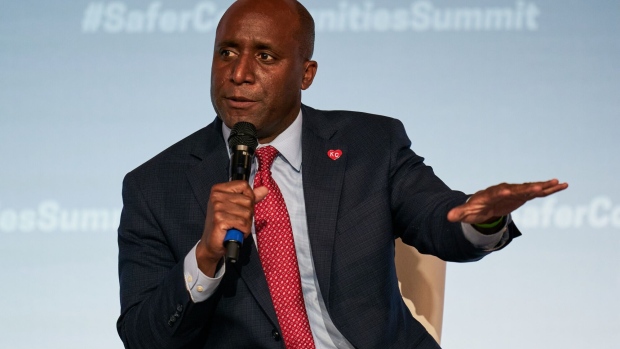Apr 16, 2024
NYC Migrants Are Being Welcomed by Kansas City’s Mayor to Fill Jobs
, Bloomberg News

(Bloomberg) -- The mayor of Kansas City, Missouri, has a message for migrants eager to leave New York City’s shelters: Come find a job here.
Construction and manufacturing are booming in the metro area of 2.2 million people, which includes portions of Missouri and Kansas. Building a battery plant for Panasonic Holdings Corp. will require 2,000 workers, a representative for the local union council estimated, and Meta Platforms Inc. and Alphabet Inc. are spending almost $2 billion combined on new facilities in the region. In the past five years, companies have announced $9 billion of investments, according to a local development group.
Kansas City Mayor Quinton Lucas has a hunch that migrants with work permits could help alleviate the labor shortage that has built up as his city posts some of the region’s fastest economic growth. That could also help ease the burden on cities like New York that have struggled to provide housing and support for an unprecedented influx of new arrivals, many of them asylum seekers from Latin America.
Kansas City’s economy is particularly attractive for blue-collar workers, with an industrial base anchored by plants for Ford Motor Co. and General Motors Co. and a big food manufacturing industry. Amid the construction boom, more than 70% of contractors in Missouri and Kansas say they can't find enough workers.
“We need a lot more employees,” Lucas said. “If there are people who are willing and ready to work, then I believe that there could be a place for them.”
Lucas said he has been in contact with the mayors of New York and Denver, another hotspot for migrant arrivals, to strategize on how to identify workers who may want to come to Kansas City. He said that the city would likely know after Memorial Day what its capacity for supporting new arrivals could look like. The city of Topeka, Kansas, about 60 miles west of Kansas City, has also sought to lure migrants to help alleviate a worker shortage there.
To be sure, Lucas envisions the migrants needing extra help getting settled. The city is looking at ways it can provide housing and other support, including training and language services. The 2024-2025 budget earmarked $1 million for short-term rehousing, healthcare, and job training programs for refugees and migrants.
Migrants who apply for asylum are typically eligible to receive work authorization 180 days after filing for the legal status. Another option open to arrivals from some countries including Venezuela is to apply for Temporary Protected Status. New York City says almost 190,000 migrants have come through its intake system since early 2022, while Denver reports about 41,000 such arrivals.
Denver Mayor Mike Johnston said that when migrants get work permits, they’re instantly in demand.
“As soon as we can get folks work-authorized, this turns from a crisis into an opportunity,” Johnston said. “The conversations I have with newcomers who say, ‘All I want is a job,’ I get the same calls all day long from business leaders who say, ‘I have open jobs we can't fill, can I please hire the folks that have arrived?’”
Ralph Oropeza, the business manager for the Greater Kansas City Building & Construction Trades Council, said the labor market is so tight that traveling union members can easily find work in the area, even with their $150 per diem and overtime fees in addition to regular wages.
“If people have documentation where they can work, then we can absolutely put them to work,” he said. “This isn’t us catering to migrants, this is us catering to people.”
Sign up for the Equality newsletter for weekly reporting from Claire Suddath on how gender, race and class are shaping capitalism in America and beyond.
--With assistance from Augusta Saraiva.
©2024 Bloomberg L.P.





